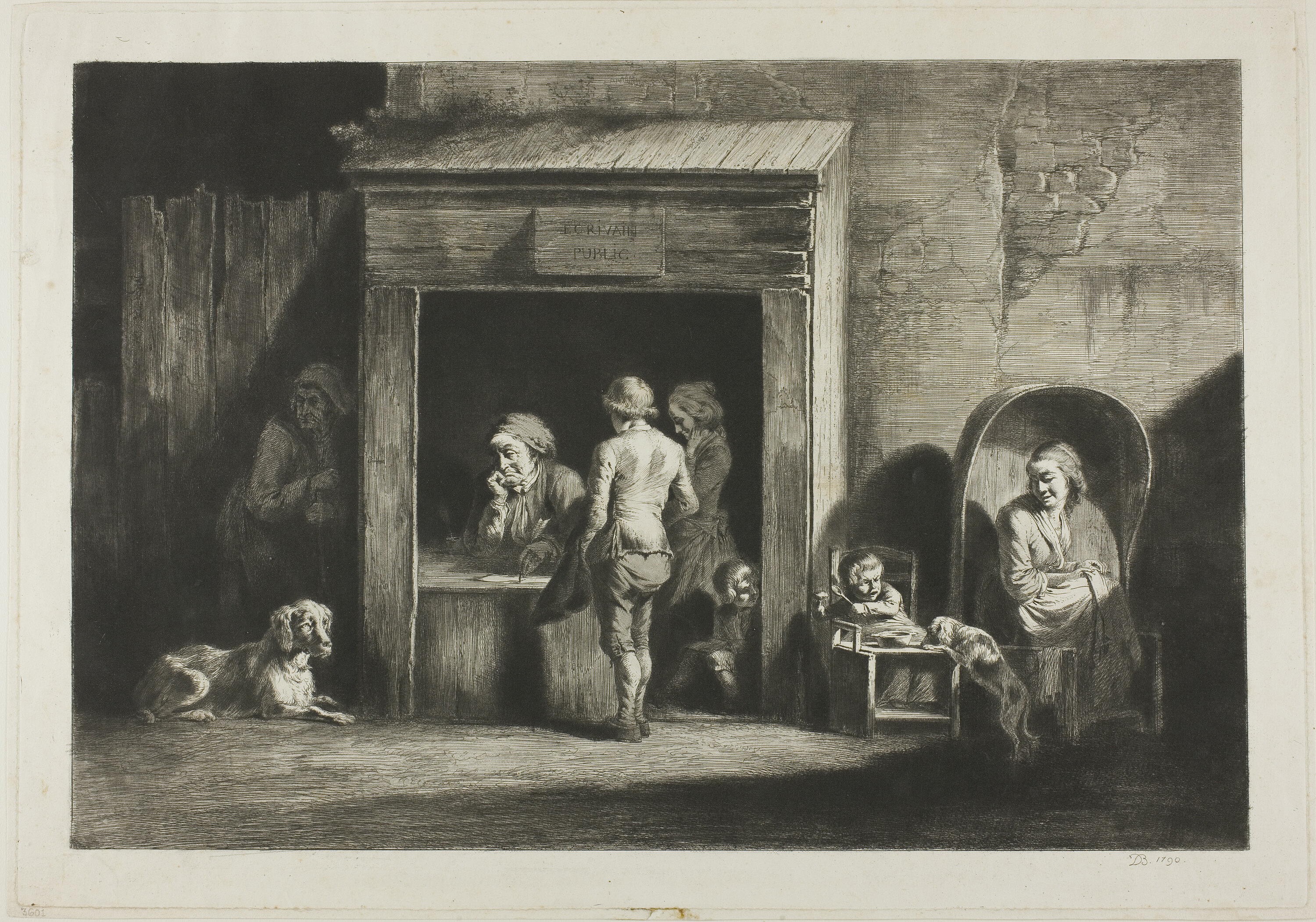CopyWrongs

Jean Jacques de Boissieu [after Jacob van Ruisdael]:
The Public Scribe (1790)
… tend to default to their Bastard setting unless questioned …"
©2023 by David A. Schmaltz - all rights reserved
Publishing exercises what's called copyright, the right to copy. According to common law, copyright belongs to the creator of a work, though that ownership can and often is bargained away in exchange for Publishing. For example, one common precondition to achieve publication involves the creator agreeing to assign their copyright ownership to the work over to the publisher. This transaction has become so widespread now that it's rarely questioned, though other agreements remain possible. For example, some publishers satisfy themselves with First Print Rights, accepting that the author rightfully owns their work in perpetuity but that they might share the work more broadly without making an orphan out of it.
Copyright, in practice, seems a civilizing convention. It recognizes nothing more than the obvious. It asks for little besides consideration, insisting only that anyone using the material first ask for and receive permission. The internet has encouraged plagiarism, though, as many seem to presume that if it's accessible, it's free and wide open for reuse in whatever form the shoplifter desires. Fortunately, shoplifters rarely understand how to properly use whatever they swipe, so their presumptions seem overwhelmingly apparent in their finished products. There are infinite resources of open source material now, stuff like the illustrations I use for my postings, which exist in what's called the public domain, owned by nobody since their creator long since left the building.
I've seen my creations stolen and used without attribution. I once even attempted a legal remedy, hiring a shyster attorney to represent my interests. I served the shoplifters with papers threatening worse, but even then, they refused to admit their guilt. The lawyer said I could easily spend six figures failing to force them to cease and desist, so I told them that I would inform their clients that they were party to a serious violation, encouraging them to fire them lest they get served some papers for colluding. That produced a Donald Duck-quality response from the shoplifters, and I went on my way, no wealthier or more vindicated for the experience. Copyrights only work when respected by people of good faith. The unscrupulous can undermine the whole system, and do, without any real recourse or comeuppance.
I was fortunate, when The Blind Men was published, that it was published by an ethical publisher who did not insist upon my forfeiting my copyright ownership as a precondition for the deal. They settled for first rights, and all seemed perfectly right with the world. I have no complaints. A colleague once contributed a bunch of his workshop material for a book he'd agreed to help create for a trade association, only to find that association suing him later for using his material in his own workshop. He had no recourse, of course. He had not scrutinized the fine print, which tends to taketh away whatever the large print so proudly promises. That same trade group purchased a publication to which I often submitted articles. The editor sent me a message shortly after, reneging upon our earlier first-use agreement, reporting that the new owners asserted ownership of anything they published. I regretfully said my goodbyes. I sell my work, but not yet my soul.
Some might wonder what I've gained by insisting upon retaining my ownership interest in my soul. I have not grown rich, though I have retained a fair modicum of self-respect, which might not pay for groceries but which still seems well worth my efforts. Standard consulting agreements routinely insist that the client gains ownership of everything their consultant presents, even though much of what any consultant uses, they won't themselves own. They've been employed under fair use and cannot legally agree to cede ownership they do not possess. Few consultants or clients ever notice when they collude like this, but The Muse and I always insisted upon amending those terms and made the change a deal breaker. Most clients had never noticed what their legal department had attempted to saddle them with and quickly agreed to the changes. Large companies, including large publishers, tend to default to their Bastard setting unless questioned, and often insist upon it even then—caveat crēâtor.


